The article was originally published on Codica blog.
Progressive web applications are gaining momentum. E-commerce quickly adopted this innovative trend and turned their websites into fast loading and secure PWAs. This approach enabled them to enhance user experience and increase sales.
In this post, we will discuss the most successful cases of PWA implementation in the e-commerce industry and find out how to improve the main KPIs with their help.
What are the benefits of PWAs for e-commerce
First, let’s take a look at the key benefits of this technology for e-commerce platforms.
Customer engagement and re-engagement
Today consumers’ expectations are higher than ever. Online marketplaces are aware of this fact and actively use PWAs to interact with their customers. Merchants send push notifications to inform the audience about new products, special offers, and discounts.
In addition, the “Add to Home Screen” option of PWAs makes it easier for consumers to come back to the website and re-engage with their favorite brands.
Finally, a rapid installation increases users’ reach. Customers who don’t want to download and install native apps may give progressive web apps a try.
Improved security
To manage a profitable marketplace, you need to earn the trust of buyers and sellers. Let both parties know that it is completely safe to buy and sell products there and they will use your platform on a regular basis.
PWAs use HTTP protocol and SSL certificate to protect transmitted data and prevent men-in-the-middle attacks.
Higher conversion rate
Web speed and performance are crucial for your online marketplace. It may happen that the slow speed of response and bad performance will leave you without the desired conversions.
PWAs are noted for excellent performance. Users can find a required product or purchase an item online on such websites much faster.
Besides, progressive web applications cache and display images, text, and other content efficiently. As a result, thanks to impeccable performance you can boost conversion rates.
Seamless performance on unstable networks
Offline mode is another advantage of PWA technology. Thanks to built-in Service Workers, the content of a progressive web app is cached automatically. It means that users can access the required data even without the Internet connection.
The offline functionality will be a great bonus for people living in rural communities where the Internet connection is weak or consumers going in and out of connectivity during the day.
Improved search ranking
After launching mobile-first indexing in 2018, Google prioritizes fast and mobile-friendly websites. That’s when PWAs possessing these qualities will be helpful for your business.
First, progressive web apps are mobile-friendly websites in their nature. Users don’t need to download them from the app stores. They add an app to the home screen of their devices and interact with it right away.
Besides, since a PWA is still a website, Google discovers and indexes it easily. It means that when users are looking for a particular item available on your online marketplace, they will find your platform and you will have better chances to get traffic and leads.
Cost-effectiveness
The native app development requires building, maintaining, and promoting a separate version for Android and iOS operating systems. Since you need to hire two development teams, the total cost of your product is two times as expensive.
Besides, there is no guarantee that customers will want to download your app.
With the PWA development approach, building an application will require less time and money because now you will have only one cross-platform app to launch. In this regard, you can significantly cut down expenses on creating a mobile app.
Best PWA examples for online marketplaces
You have seen the undeniable benefits of PWAs for the e-commerce industry. Now let’s take a look at concrete results.
Jumia
Jumia is a prominent African e-commerce website. Its target audience accesses the platform via an unstable 2G Internet connection. Besides, most customers owning low-end phones face data limitations issues.
Jumia found a good way to provide shoppers with a smooth user experience. Their website was transformed into a PWA.
Fantastic stats that prove the successful PWA implementation by Jumia look the following way:
- 33% higher conversion rate;
- 50% lower bounce rate;
- 12X more users versus native apps (Android & iOS);
- 5X less data used;
- 2X less data required to complete the first transaction;
- 25X less device storage needed.
Flipkart
Flipkart is a famous Indian e-commerce platform. In 2015, the company abandoned its mobile website that could not overperform a native app in terms of fast and responsive user experience.
That’s when Flipkart Lite was built. This progressive web application offered customers a great native app’s experience. Push notifications allowed getting timely and relevant updates from favourite stores and working in offline mode.
PWA implementation brought exciting results, including:
- 3x lower data usage;
- 40% higher re-engagement rate;
- 70% more conversion rate by “Add to homescreen”;
- 3x more time spent on site.
AliExpress
AliExpress is a global online retail company launched in China in 2010. Their mobile commerce platform was growing much faster than e-commerce.
So the company built a solution that caters to the needs of both web and mobile customers. A fast and reliable progressive web app allowed AliExpress to revamp its mobile presence, improve visitor engagement, and increase conversion rates.
The PWA got a remarkable 91/100 from LightHouse thanks to a number of useful features including push notifications, offline mode, fast page load, and seamless UX/UI.
Let’s take a look at the impressive results that PWA implementation brought:
- 82% increase in iOS conversion rate;
- 104% more new users across all browsers;
- 2x more pages visited per session per user across all browsers;
- 74% increase in time spent per session across all browsers.
OLX
OLX is a global online marketplace headquartered in Amsterdam that operates in 45 countries. The majority of traffic (90%, to be more specific) comes from the native app and mobile website. The application brings the most conversions while the website has a high bounce rate due to low performance.
The company needed a solution that could improve the metrics in the above fields. That’s when a progressive web application came into play.
As in other cases, PWA implementation proved successful. The ‘Add to home screen’ feature and push notifications increased the engagement level by 250%.
Other results look the following way:
- 23% less time until a page is interactive;
- 80% lower bounce rates;
- 146% higher click-through rate on ads;
- 250% more re-engagement.
Alibaba
Alibaba is a global wholesale trade platform serving millions of buyers and sellers in more than 200 countries. Most users discover this e-commerce website via the mobile web. Therefore, a well-designed and highly functioning mobile web experience was their priority.
The company transformed their mobile website into a PWA. Their aim was to provide both first-time and repeat visitors with a fast and engaging mobile experience.
Here are some important metrics.
- 76% higher conversions across browsers;
- 14% more monthly active users on iOS;
- 30% more monthly active users on Android;
- 4X higher interaction rate from the ‘Add to Homescreen’ feature.
Conclusion
Progressive web applications offer numerous benefits to e-commerce marketplaces. However, the specific figures make the power of the technology even more meaningful.
For more information about the advantages of progressive web apps for online marketplaces and best cases of their implementation, read our full article 5 Best Examples of PWA for E-commerce Marketplaces.


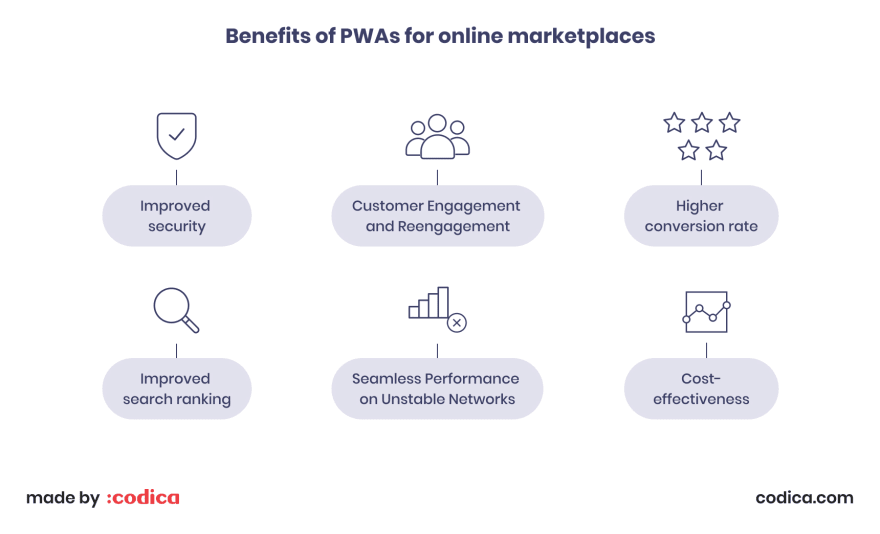
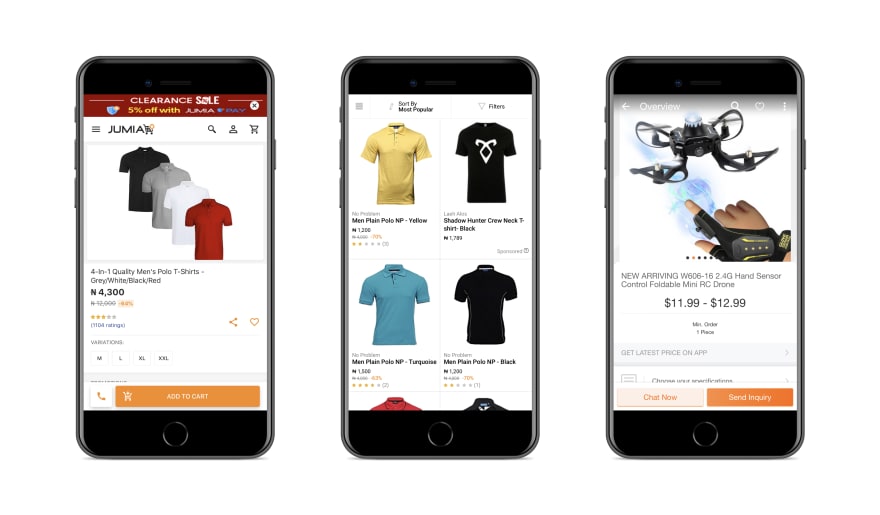
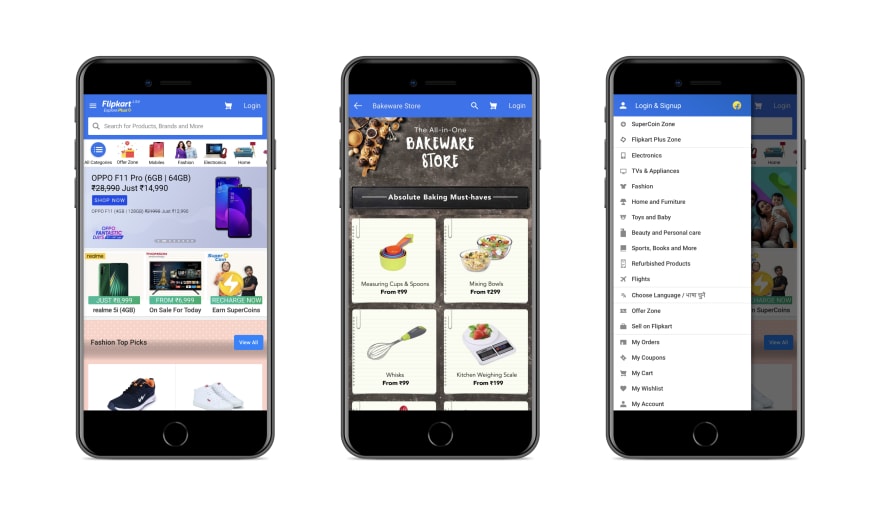
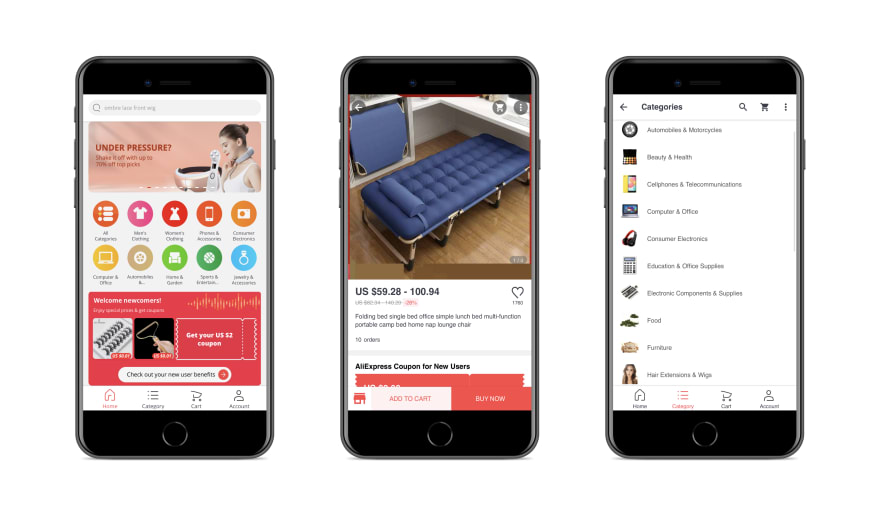
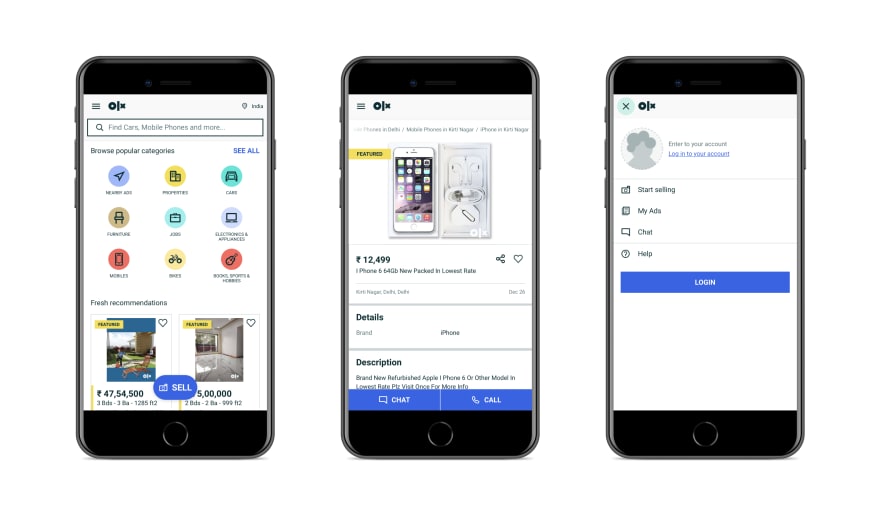
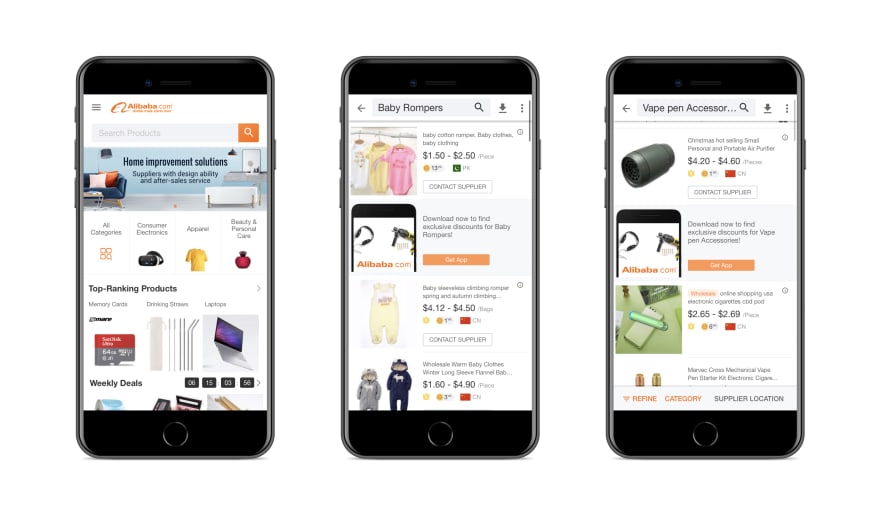

Top comments (0)